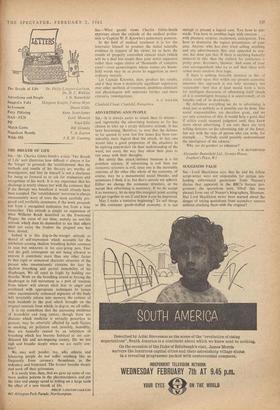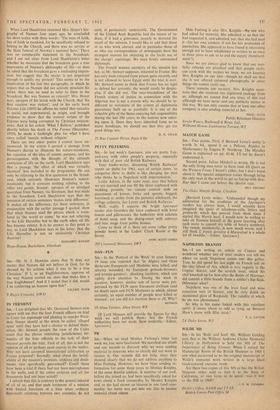SUGGESTIO FALSI
Sin,—Lord Shackleton says that he and his fellow script-writer were not responsible for certain mis- leading abbreviated quotations from Nansen's diaries that appeared in the BBC's feature pro- gramme; the quotations were 'lifted' (his own phrase) from one of Nansen's biographers, Sorenson. Has Lord Shackleton never been warned about the danger of taking quotations from secondary sources without checking them with the original? ' When Lord Shackleton reviewed Mrs. Hoyer's bio- graphy of Nansen four years ago, he concluded hit short notice with these words: 'The man of faith, but of faith in mankind, for he steadfastly refused to belong to the Church, and there was no service at the State funeral of Norway's national hero.' There was no comparable statement in the broadcast; and I am not clear from Lord Shackleton's letter whether he maintains that the broadcast gave a true impression of Nansen's philosophy of life—or does he admit that the broadcast gave a misleading impres- sion, but suggest that the matter is not important enough to justify my protest? This seems to be the implication of his last two paragraphs, in which he argues that as Nansen did not actively proclaim his views, there was no need to refer to them in the broadcast. But was Nansen so reticent? Mrs. Hoyer says, apropos of his break with the Church, that 'his first reaction was violent'; and in his early book Eskimo Life (1893) he affirms his belief that morality is social, not supernatural, in origin, arid brought evidence to show that the natural virtues of the Eskimo were being corrupted by Christian mission- aries. And in his article 'What I Believe,' published shortly before his death in The Forum (December, 1929), he made a forthright plea for what I have since called 'morals without religion.'
There are two other points I cannot leave un- answered. In my article I quoted a passage from Nansen's diaries to illustrate his nature-mysticism, his rejection of the idea of cosmic purpose, and his preoccupation with the thought of the ultimate extinction of life on the earth. Lord Shackleton says that a passage 'the effect of which was virtually identical' was included in the programme. He can only be referring to the first quotation in the broad- cast, which certainly illustrates Nansen's nature- mysticism; but it contains nothing relating to the other two points. Second: apropos of an abridged quotation from Nansen, via Sorenson, that was made in the broadcast, Lord Shackleton says that the omission of certain sentences 'makes little difference.' It makes all the difference; for these sentences, in conjunction with the earlier passage I quoted, show that when Nansen used the phrase which is trans- lated as 'the world to come,' he was not referring to the Life Hereafter but to the earth when all life has become extinct. It is no answer to this point to say, as Lord Shackleton says in his letter, that the Life Hereafter is not an exclusively Christian doctrine!
MARGARET KNIGHT
Hope House, Bucksburn. Aberdeen



































 Previous page
Previous page